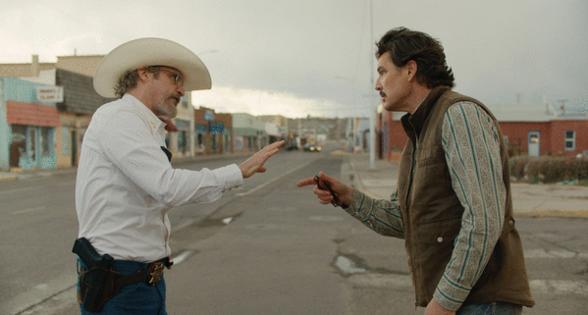'Eddington' review: Joaquin Phoenix and Pedro Pascal, once upon an early COVID time in the West
Published in Entertainment News
This is where we are, as the lawman says in “Eddington”: “We are in the center of it right now. We are in history.”
This summer, in 2025, history can barely contain each new 24-hour blurt. It feels less like we’re in history and more like we’re choking on it. So we remember Shakespeare’s perfect three syllables to describe dark political machinations. “Out of joint,” Hamlet says of his country and his time. Like a dislocated shoulder.
Ari Aster’s “Eddington” is not Shakespeare, and isn’t trying, and half the time it can’t be said to know what it’s doing, or how to dramatize what it’s going for. But I’ve seen it twice for the good stuff, and for the riddle-solving of why whole, frustrating chunks of this two-and-a-half-hour American fable compete with the rest of it.
Aster has taken on one of the toughest challenges a writer-director can attempt: extremely recent history, out of joint and somehow present, not past. “Eddington” is set in May 2020, three months into the COVID-19 pandemic, in a part of the world where personal freedoms trump the common good — which is another way of saying there’s a lot of unmasked transmitters around town.
Joaquin Phoenix takes the role of Joe Cross, sheriff of the (fictional) New Mexico town of Eddington. Part blunt-force satire, part topical, state-of-the-nation drama, “Eddington” is also a Western, an early COVID-era Western at that, with the sheriff — a foolish mediocrity and the son-in-law of the previous sheriff, now deceased — squaring off against the town’s mayor Ted Garcia, a crafty operator played by Pedro Pascal.
Garcia, running for reelection, backs a controversial “data center” construction project, which threatens to cripple the region’s already drought-prone water supply. The First Nation tribal residents of this corner of New Mexico are fighting this development. Even without it, Sheriff Cross has unrelated and unresolvable issues with Mayor Garcia; years earlier Garcia may have had some sort of relationship with Louise (Emma Stone, underused, to say the least), now the sheriff’s wife. The sexual trauma in Louise’s past, and her present, rickety state, is something her husband does not have the emotional resources to confront.
Both Eddington and “Eddington” trade in soap opera-y secrets and subterranean conspiracies involving dirty law enforcement, incest, male sexual jealousy, good lawmen getting shafted, a small clutch of Eddington’s young Black Lives Matter protesters spouting newly acquired racial reckoning verbiage they barely comprehend, and so much more. In the immediate wake of the George Floyd murder in Minneapolis, things are getting hot all over. Eddington does not know how to deal with its present historical moment.
Unhelpfully for “Eddington,” the movie, Aster responds to the question of “how to wrap this thing up?” with a wildly florid action climax. This pits the sheriff against anonymous killers, Eastwood style, but with pesky drones and shadowy corporate interests raising the stakes. The last 30 minutes of the film feel almost completely misjudged, and absurd, but not satirically effective; it’s just a dive into adolescent Tarantino ultraviolence.
But getting there, “Eddington” is none of those things. It’s particularly astute in Aster’s little details and flurries of early COVID. Sheriff Cross isn’t really having the whole masking thing, and Phoenix wisely keeps the character’s bullheadedness realistic, not exaggerated. When the story begins, COVID has yet to officially arrive in Eddington. The pandemic is like the Black Lives Matter protests and the national violence so often flashed on TV screens and laptops; it’s “not a ‘here’ problem,” Cross says, partly to reassuring his own crumbling confidence.
The filmmaker gave us the punishing family nightmare “Hereditary,” the “Wicker Man” riff “Midsommar” and the half-wondrous, half-exasperating dreamlike odyssey “Beau Is Afraid.” With “Eddington,” Aster has made a distinct period piece, nailing many woeful details about where we were five years ago. And where we are now. Too few American movies, ever, have caught current history successfully. And as London-based critic Damon Wise wrote about “Eddington” in its Cannes Film Festival premiere earlier this year: “How do you make a satirical movie about modern America when the news that comes out of there every day is quite literally beyond a joke?”
This is the peculiar thing about “Eddington”: At Cannes, it apparently played like sledgehammer satire of both idiot conservatives and ridiculous, self-loathing liberals, and it still does, I suppose. Yet it’s hitting differently now. When Aster lays off the easy comic despair in favor of more ambiguous and dimensional feelings, interactions and moments, “Eddington” becomes the movie he wanted. His script has a million problems with clarity, coincidence and the nagging drag of a protagonist set up for a long, grisly comeuppance, yet “Eddington” is probably Aster’s strongest film visually, with cinematographer Darius Khondji creating the light and shadow for some sweeping, gently ironic evocations of Old West and Old Hollywood myth-making.
The myths this time are not reassuring. “Eddington” will probably age rather well — even, and perhaps especially, if Aster’s explicit anticipation of martial law as America’s next great experiment proves accurate.
———
'EDDINGTON'
3 stars (out of 4)
MPA rating: R (for strong violence, some grisly images, language, and graphic nudity)
Running time: 2:28
How to watch: In theaters July 18
———
©2025 Chicago Tribune. Visit chicagotribune.com. Distributed by Tribune Content Agency, LLC.













Comments